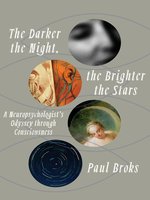by Paul Broks
The Darker the Night, The Brighter the Stars weaves a scientist’s understanding of the mind – its logic, its nuance, how we think about what makes a person – with a poet’s approach to humanity, that crucial and ever-elusive why. It’s a story that unfolds through the centuries, along the path of humankind’s constant quest to discover what makes us human, and the answers that consistently slip out of our grasp. It’s modern medicine and psychology and ancient tales; history and myth combined; fiction and the stranger truth.
But, most importantly, it’s Broks’ story, grounded in his own most fascinating cases as a clinician—patients with brain injuries that revealed something fundamental about the link between the raw stuff of our bodies and brains and the ineffable selves we take for who we are. Tracing a loose arc of loss, acceptance, and renewal, he unfolds striking, imaginative stories of everything from Schopenhauer to the Greek philosophers to jazz guitarist Pat Martino in order to sketch a multifaceted view of humanness that is as heartbreaking at it is affirming.
The Darker the Night, The Brighter the Stars weaves a scientist’s understanding of the mind – its logic, its nuance, how we think about what makes a person – with a poet’s approach to humanity, that crucial and ever-elusive why. It’s a story that unfolds through the centuries, along the path of humankind’s constant quest to discover what makes us human, and the answers that consistently slip out of our grasp. It’s modern medicine and psychology and ancient tales; history and myth combined; fiction and the stranger truth.
But, most importantly, it’s Broks’ story, grounded in his own most fascinating cases as a clinician—patients with brain injuries that revealed something fundamental about the link between the raw stuff of our bodies and brains and the ineffable selves we take for who we are. Tracing a loose arc of loss, acceptance, and renewal, he unfolds striking, imaginative stories of everything from Schopenhauer to the Greek philosophers to jazz guitarist Pat Martino in order to sketch a multifaceted view of humanness that is as heartbreaking at it is affirming.







